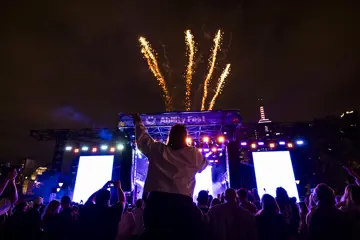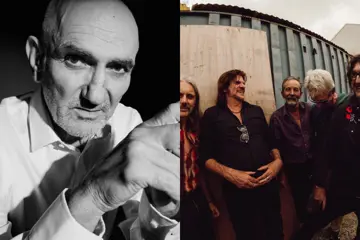Inua Ellams was just 12-years-old when he and his family fled their native Nigeria. Born to a Muslim father and Christian mother, his parents' differing faiths proved a dangerous combination in a country where militant elements of fundamentalist Islam thrived. Threats were made against the family, an uncle disappeared in suspicious circumstances, and Ellams' parents were left with a single bleak choice: stay or survive.
Twenty years on, Ellam is now based in London, were his family arrived as refugees in the early '90s. A celebrated poet, with four published collections to his name, a theatre-maker who has produced a series of stage works for the National Theatre amongst other prestigious venues, and an internationally in-demand speaker, Inua's accomplishments have earned him a plentiful supply of admiration and success. He's even attended a Royal garden party at the invitation of Her Majesty the Queen. And yet, despite this glowing recognition, the United Kingdom's Home Office refuses to recognise Ellams, or the rest of his family, as British citizens. With only discretionary leave to remain, he must apply to extend his stay in the UK every three years, and even though he has lived in the country for more than two decades, there are no guarantees that his applications will be successful. His next extension request is due in December.
Ellams shares his experiences of life as a refugee in An Evening With An Immigrant. Part lecture, part poetry reading, part autobiopic, this witty, moving, eye-opening event reveals the humanity behind a topic that has become one of the most divisive in the political zeitgeist. For Ellams, poetry is a particularly potent vehicle for his remarkable story. "Poetry saved my life. It is the cheapest way to be free. It's good at painting pictures, at giving images that are clear, that are precise, that are detailed. And it's good at presenting a truth and letting the audience make up their own minds. It's a great way to bring compassion and empathy and emotion to the forefront of a listener's mind," Ellams shares. "Poetry is one of the things that people tend to hold onto in times of emotional stress: births, deaths, marriages, trauma, self-healing, self-care, et cetera. I think that's why it works in the context of this show. I don't do much. I don't show you films, I don't just give you stats or figures. All I say is, 'This is what happened,' in a language that is clear and that is precise, which the audience will listen to and populate with their own images and their own imaginings. And in doing so, they paint themselves into my world."

This intimate event may draw on two decades worth of experiences, starting its narrative long before the pugnacious political grandstanding that has given rise to Brexit, Trump's travel ban, and Manus Island. But Ellams is nonetheless acutely aware of how pointedly relevant his poetry has become in the current geopolitical climate. And how important it is, now more than ever, for the stories of immigrants to be championed.
Don't miss a beat with our FREE daily newsletter
"What we've seen in Charlottesville, where racists feel legitimised to act out their ill-conceived fantasies, it's very disturbing. I think we're in a situation now, where liberal-minded people across the world are having to take a hard look in the mirror and say, 'We are not like those racists, and we disagree with what they represent. But in the past, we've stayed silent. We've never come out and stood against this, we just kind of stayed in our own world and hid in the shadows,'" he explains. "Now that these people, who are our very antithesis, are standing up, and coming into the light, we who oppose them can't stay in the shadows any longer. We have to come out, we have to stand against them, we have to stand in the light and say, 'This is not representative of our culture, of our beliefs, of our capacity for empathy and understanding.'"
Ellams' story is one born of violence and displacement, that resonates with dark forces working in the world today. And yet, it is far from bleak. Delivered with disarming charm and buoyant, whimsical humour, An Evening With An Immigrant is an uplifting statement about how compassion and creativity can overcome even seemingly overwhelming odds. "I didn't think of my family's experience, having to leave Nigeria, as being particularly grim at the time. I was a kid, and I was too young to see it in that kind of objective way. They were just things that happened to our family. We just had to move on and get on with life," he says. "There was a recent survey which said that Nigerians are the happiest people on earth. And there's grinding poverty in Nigeria, particularly Lagos, particularly in the north where I was born. But people just get on with life. Sometimes that's because they don't know any better, they don't know to be jealous about things that they don't know they don't have. And that was my story. Personally, I need very little to create: just a piece of paper and pen - and even that is optional. Other than that, all I need is a place to live in the world, where I can be happy, where I can play. I think that has a lot to do with my Nigerian heritage, which is about positivity, making something out of nothing and doing the best you can with the little that you have."
Inua Ellams performs An Evening With An Immigrant, 3 Sep at Sydney Town Hall, part of the Antidote Festival Of Ideas Art And Action















